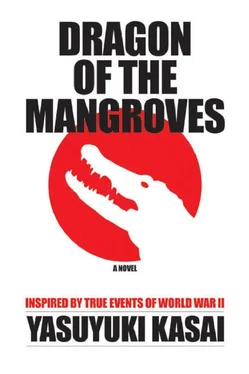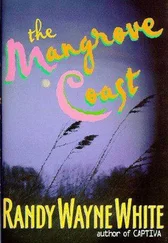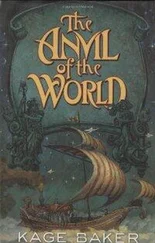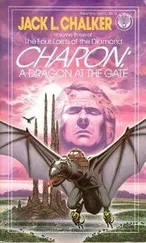While the two sergeants argued, Kasuga toyed with a thought from the previous night’s events. One man accidentally let out a sound, and that caused the exposure of everyone. Was someone drowning from exhaustion on the way across? He closed his eyes and remembered the figures of the Seventh Company soldiers swimming with steady, powerful strokes. Many of the Second Battalion came from fishing villages, so they had a lot of good swimmers. Those who took on the vanguard should have been even better. Could they really have drowned so easily?
Then the puddle of jellied blood he had seen three days before crossed his mind, followed by the image of the white amputated leg—the remains of First Lieutenant Kishimoto, most likely. Those countless gashes on it must have been teeth marks. Further, the golden eye and the distinctive stench, like a mixture of mud with carrion, returned to him. The pitiful soldier might have suffered the same fate as Kishimoto.
The same terror he had felt in the mangrove at dusk struck him again. Kasuga believed everything was happening as he had feared. But the inference was too gruesome to accept easily, even though he drew it himself. In the middle of the sweltering and scorching heat, he couldn’t stop shivering.
Kasuga worried about food as well. In his haversack, he had kept nothing to eat except for several pieces of soggy, stale hardtack and about one liter of rice trans-ferred from the hollow of the bamboo. It seemed almost impossible for him to stretch those out for a week. Unable to put up with the heat, he had consumed all the water in the bamboo during the day. Now he had only a canteen-full of water left. The bamboo was empty. Nonetheless, he couldn’t discard it, since he learned from the experience the night before that he had to rely on its buoyancy to swim across that vast stretch of water.
Kasuga crawled between the entangled prop roots on his hands and knees, and caught a mudskipper and a crab in the early afternoon to save provisions. He dared to eat them raw, but both were too salty to be considered edible.
His shrapnel wound showed little improvement. The wound didn’t close a bit, and a considerable amount of pus was accumulating in it. He was worried it might get infested with maggots if things continued this way. But he had nothing to tend it with, because he had already run out of bandages.
Worse yet, he felt weak and sluggish; he might have had a relapse of malaria.
He couldn’t understand why he was gasping for breath in such a gloomy place.
Before he knew it, he was no longer concerned with his own resolution at the time of enrollment, or with the purpose of the holy war. His ability to think clearly was fading. So except for instinctive and momentary matters, nothing stimulated his brain now.
Tomita encouraged him, saying, “Kasu, don’t worry about food. I’ll hunt monkeys with my handgun when we really need it. But everything will be good after we get to the continent safely. You can even have your wound treated if only we can make it to Taungup. Anyway, concentrate on swimming in one piece now.”
Eating monkeys didn’t appeal much to Kasuga. But he smiled feebly and gave a vague nod.
On the other side, Tomita had devoted himself entirely to the escape. He had been scouting along the bank the whole day to find a suitable starting point. He thought it wouldn’t be very smart to leave the shore that night from the same point as the day before. That kind of vigor, never shown by Tomita previously, was so impressive that Kasuga wondered where his leader had kept such strength in reserve.
According to his survey, a confluence of Myinkhon Creek and a brooklet from Yanthitgyi lay about four kilometers south of the starting point of the day before.
Tomita intended to guide them there. He said the bulging water formed a deep-enough cove there. It also seemed suitable for gunboats to lurk in, because the mangrove there grew densely, as well.
“Those Engli boats are junk, but they’re fairly big,” Tomita said. “They need some deep water, like a cove, to anchor. The boat came from the north yesterday.
Maybe good hideouts lay somewhere north. If there is no boat hiding itself inside the south cove I’m talking about, the possibility of getting caught by any ambush around the south bank is weak. It’ll be a good signal that the area is safe. We can take it. Let’s go there tonight and watch it!”
He told the men that they had better advance to the area around the cove under cover of night and feel out the enemy there. They must halt the operation at once if they detected any signs of ambushes. But if the cove was clear, they should carry out the crossing at once after scrutinizing the brightness of the moon and stars and the status of the tide.
The more southward they moved, the wider the water they must swim. And
Leikdaung Island, the transit point, would also recede into the distance. But it was nothing compared with being spotted and riddled on the way.
Tomita’s words were so confident and persuasive that neither Kasuga nor Tada nor any of the strays of Fifth Company raised the slightest objection.
At sunset, Kasuga headed for Myinkhon Creek as one of the group of twenty-odd members. Each member tottered in the mud with a bamboo pole on his shoulder again. Tomita Squad was downgraded to a three-man-party by then.
Led by Tomita, the column went through the mangrove. They could see the sky fairly clearly through the foliage overhead. Not a cloud was seen. Instead, the waxing, silvery half-moon shone. The moonlight filtered in so brightly that everyone could distinguish one soldier from another. Their march progressed, and they came to the edge of the creek.
A brooklet flowing from the west abruptly cut through their path when they went southward along the waterside for half an hour. They had just arrived at the
confluence Tomita had mentioned. The water surface widely encroached on the surrounding mangrove; it was the south cove. The stagnant, dark water reeked of a botanical, putrid smell. It was quite a dreary place. However, they saw no vessel.
Some men quick on the trigger began undressing among a succession of sighs of relief. But Tomita was wary and held them back. “Don’t do that! It’s too bright yet. If the enemy comes, they’ll get us in plain sight. Wait until the moon sets.”
Sergeant Steel Bar argued against him. “Let’s go before it gets too dark. We’ll get lost in the darkness even if we can get to the opposite bank. We can worry about the enemy later.”
Tomita said, “I know what you’re saying, but we’d better wait a bit longer.
We’re probably not the only guys going to swim across tonight. Some rash idiots may run out into the creek first and act as a decoy.”
Sergeant Steel Bar slyly smiled and nodded. “I see, you crafty old dog. You’re right. Haste makes waste, doesn’t it?”
Now in the wait-and-see mode, Kasuga held his bamboo pole in his arms and sat on the ground. Then he idled his time away silently.
He felt a chill, as if he had a fever. He couldn’t stop his whole body from quiv-ering, feeling like his spine was slowly freezing. But his clothes had long since been dry, and the air wasn’t cool. The chill could be the result of the malaria returning on a full scale, which he had been worrying about.
Sitting next to him, Tada was ardently cleaning his rifle with a rag. Kasuga didn’t know whether he was merely passing the time or focusing his concentra-tion before the operation. But such behavior—uselessly anticipating combat—kindled his anxiety. Unable to stand it any longer, Kasuga spoke to him in a low voice. “Maintenance is nice, indeed. But stop it. What are you going to do with it? You can’t shoot while you’re swimming.”
Tada stopped his hands and looked at Kasuga. Bathed in starlight, his eyeballs were glittering. “I know. But I can’t stop feeling uneasy,” answered Tada.
Читать дальше












